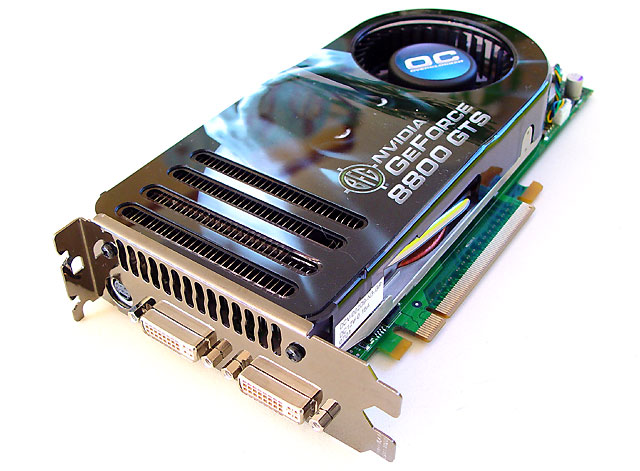Page 10
Hardware and Software Used
Now we begin the benchmark portion of this article, but first let me show you our test system plus the software we used.
Mainboard
nVIDIA nForce 680i SLI (eVGA)
Processor
Core 2 Duo X6800 Extreme (Conroe)
Graphics Cards - Single
GeForce 7950 GT 512 MB reference
GeForce 8800 GTX 768 MB reference
GeForce 8800 GTS 640 MB BFG
GeForce 8800 GTS 320 MB BFG OC edition
GeForce 8800 GTS 320 MB BFG XXX edition
Graphics Cards - SLI
GeForce 8800 GTS 320 MB BFG OC edition
GeForce 8800 GTS 320 MB BFG OC edition SLI
GeForce 7950 GX2 2x512MB reference
GeForce 7900 GT 512 MB SLI
GeForce 8800 GTX 512MB SLI
Memory
2048 MB (2x1024MB) DDR2 CAS4 @ 1142 MHz Dominator Corsair
Power Supply Unit
Enermax Galaxy 1000 Watt
Monitor
Dell 3007WFP - up-to 2560x1600
OS related Software
Windows XP Professional SP2
DirectX 9.0c End User Runtime October update
NVIDIA ForceWare 96.94 Beta (G80)
NVIDIA ForceWare 93.71 WHQL
ATI Catalyst 6.10
NVIDIA nForce 590/680iplatform driver 9.53
Software benchmark suite
3DMark05
3DMark06
Far Cry (with HDR)
Ghost Recon: Advanced Warrior
F.e.a.r.
Half-Life 2: Episode One
Splinter Cell 3: Chaos Theory
Prey
Company of Heroes
Serious Sam 2
Battlefield 2
X3: the reunion
A word about "FPS"
What are we looking for in gaming performance wise? First off, obviously Guru3D tends to think that all games should be played at the best image quality (IQ) possible. There's a dilemma though, IQ often interferes with the performance of a graphics card. We measure this in FPS, the number of frames a graphics card can render per second, the higher it is the more fluently your game will display itself.
A game's frames per second (FPS) is a measured average of a series of tests. That test often is a timedemo, a recorded part of the game which is a 1:1 representation of the actual game and it's gameplay experience. After forcing the same image quality settings; this timedemo is then used for all graphics cards so that the actual measuring is as objective as can be.
| Frames per second | Gameplay |
| <30 FPS | very limited gameplay |
| 30-40 FPS | average yet very playable |
| 40-60 FPS | good gameplay |
| >60 FPS | best possible gameplay |
- So if a graphics card barely manages less than 30 FPS then the game is not very playable, we want to avoid that at all cost.
- With 30 FPS up-to roughly 40 FPS you'll be very able to play the game with perhaps a tiny stutter at certain graphically intensive parts. Overall a very enjoyable experience. Match the best possible resolution to this result and you'll have the best possible rendering quality versus resolution, hey you want both of them to be as high as possible.
- When a graphics card is doing 60 FPS on average or higher then you can rest assured that the game will likely play extremely smoothly at every point in the game, turn on every possible in-game IQ setting.
- Over 100 FPS? You have either a MONSTER of graphics card or a very old game.

